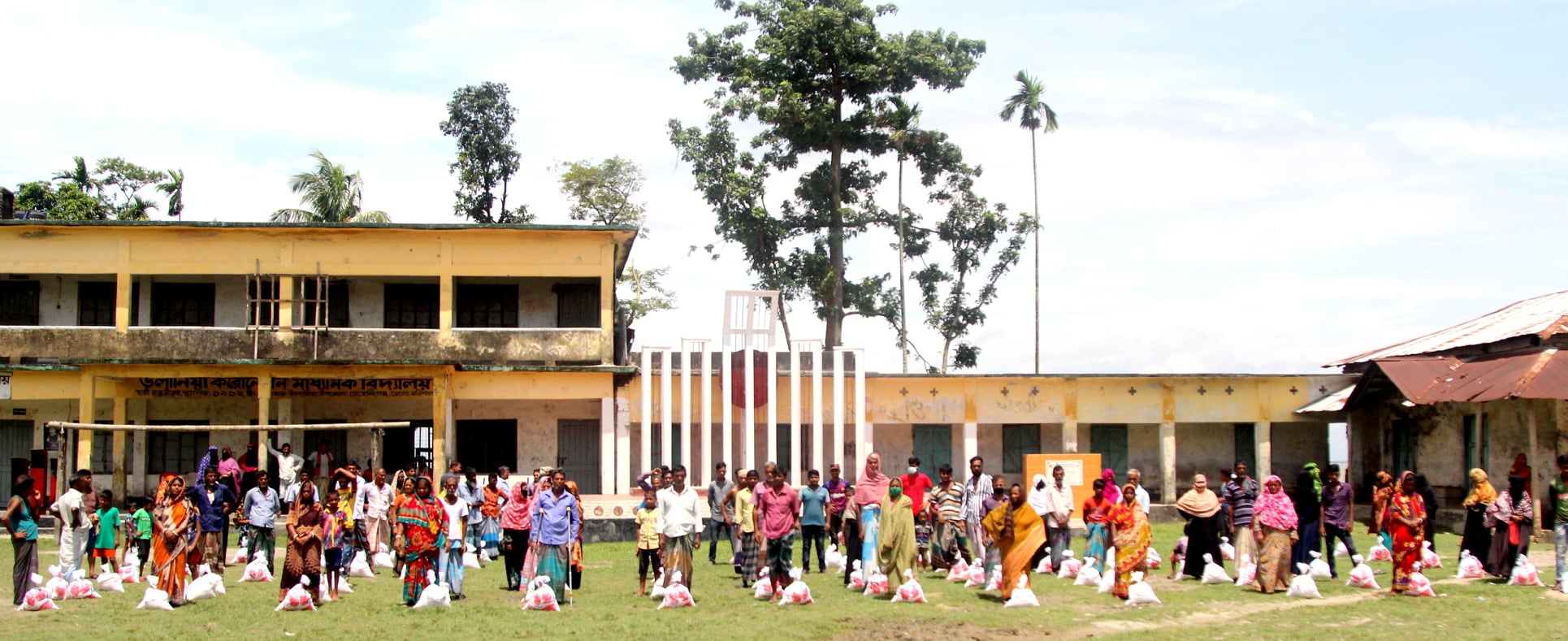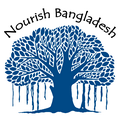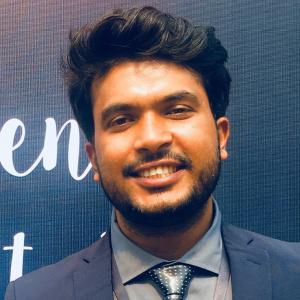Volunteer Group Led By Mithun Das

We have vetted the volunteer group led by Mithun Das. They are a candidate for funding from the Portfolio. This volunteer group is not registered with the HMRC in the UK, and therefore donations made by UK citizens to this group are not Gift Aid eligible. Similar to most grassroots volunteer groups that deal with disaster relief, they are not officially registered in Bangladesh.
Who is Mithun Das?
Mithun Das is one of three organizing members of a charity project called Alokito Shishu that is in the process of becoming a registered NGO in Bangladesh. Much of Mithun's current volunteer work is under the umbrella of this organization. Alokito Shishu was originally founded as an effort to bring quality education to underprivileged communities in Bangladesh by setting up schools, as well as to promote social and financial enterprise and self-sufficiency among the poor and marginalized. Their current priority has shifted in the wake of Covid-19, and the group is now fully focused on their initiative called Gift for Good, arranging emergency food supplies for lower-income families. The organization has successfully served marginalized groups all across Bangladesh, including the Chakma, Marma, Hajom & Shantal indigenous tribal communities, transgender communities, sex workers, and people with disabilites.
Highlights
Mithun Das and his volunteer group bring considerable experience to the work they are doing. Having been active throughout Bangladesh since the beginning of the Covid-19 pandemic, they can combine the operational competency of an NGO with the energy and commitment of grassroots volunteers. They check in with the communities they are serving, and are therefore attentive to their specific needs (such as medicine or type of food) when distributing relief. With about £7.16 (BDT 750), they can create a package of basic food and hygiene supplies lasting up to 10 days for a family of four. For funds raised through Nourish Bangladesh, Mithun will oversee the distribution himself in Dhaka. They have reach among people with disabilities.
Responses to Vetting Questions
These are the responses we were provided by Mithun Das (and Arshia Haque) who will be leading the volunteer group, with regard to their general activities and their plans for using the funds donated through our fundraising campaign. We researched and asked the same set of standard questions to the other volunteer groups we vetted as well.
Question: Does your volunteer group have a name? If so, what is it?
Response: As far as Nourish Bangladesh is concerned, we do not have a name for our group since we will be working as a volunteer group led by me. Nonetheless, it is important to note that currently I am a full time member of Alokito Shishu which is registered as a charity trust with papers awaiting NGO sanction. Similar to other trust members, I volunteer my work here and am not on the payroll. However, core administrative expenses are covered by monthly donations from the trust members. As part of Alokito Shishu, I have been taking part in a food relief campaign called Gift for Good.
Question: What is the size of your group? Can you tell us a bit about the organization or structure of your group (e.g. one organizer, three field workers, one treasurer, etc.)?
Response: Three organizers, eight field workers and six members comprising of operations team. Please note that we will employ individuals as needed for disbursing food relief funded by Nourish Bangladesh.
Question: With our donation, what do you expect the geographical spread of the relief recipient to be (e.g. Dhaka city, rural Mymensingh, etc.)?
Response: While our reach in Bangladesh is quite far-reaching, with Nourish Bangladesh's funding we will be able to work in Dhaka or areas close to Dhaka such as Mymensingh or Faridpur. Part of the reason for this geographical limitation is Nourish Bangladesh's requirement for volunteer groups to have their leader present in the field during disbursement. Since I am Dhaka based and coordinating distributions of Alokito Shishu mostly from Dhaka, I would be unable to venture far away from Dhaka.
Question: With our donation, which groups will be helped (e.g. LGBTQ community, Transgender community, street children, Garo indigenous population, sex workers, gypsy community)?
Response: Depending on where I can go, your donation may support the transgender communities, sex workers, and people with disabilities.
Question: What is your motivation to start or get involved in this volunteering work? Is your group's approach religiously neutral in term of the people you help and the volunteers you employ?
Response: My work is basically centered around Alokito Shishu. So I elaborate on Alokito Shishu here. Alokito Shishu initiated with the aim of alleviating poverty amidst marginalized rural communities in Bangladesh. Quality education, life skills, enterprise and aim for social and financial independence were areas that primarily concerned us. However, as the global pandemic, Covid-19 arrived in Bangladesh and the government had to implement a lockdown; along with a health crisis, it also brought a massive social and financial burden on people from the lower and lower middle income group who have lost their primary income source, thereby drifting towards dearth and starvation with each passing day. We then immediately shifted our full focus on arranging emergency food supplies for these affected families via our program Gift For Good. We are religiously neutral in our actions for communities we support and the volunteers we recruit.
Question: Can you give us a price breakdown of how much money is spent towards food relief (e.g. with 1000 taka we offer lentils, rice, onions, and potato for a family of 4 for two weeks) or how much cash is handed to each household (e.g. 1800 taka for each adult in a household)?
Response: With 750 taka (£7.16) we offer 8 kg rice, 1 kg lentil, 1 kg sugar, 1 litre oil, 2 kg potato, 1 kg salt, 1 soap bar, 1 sachet of paracetamol. This serves the basic food supply need for an average family of four for 10 days. We have not provided cash relief support to any household or individual yet.
Question: We prefer our donations be used for cash transfers or food relief. Nonetheless, what type of other services, if any, other than food relief or cash transfer will be provided with our donations?
Response: Most of the donations we have received so far were channeled to distribute emergency food relief. Other than that, we were also able to distribute 1,500 liters of hand sanitizer, 100 PPEs and 4,000 masks. With your donation we would be continuing to provide emergency food relief.
Question: Can you ensure our donation money is spent only on food relief or cash transfer? If not, can you provide a list of services our fund will be used for?
Response: Yes, we can.
Question: Are you able to customize your food relief or cash transfer efforts based on what we want the donation to be used for?
Response: Yes. Before handing out supplies, we ask the community what they need. For example, recently sex workers have needed more medecine and raw vegetables and less rice. We therefore are able to customize their packages. We can also customize, up to a point, the uses of Nourish Bangladesh’s donation.
Question: Do you have any mechanism to ensure transparency of exactly where our money is going?
Response: Yes. Apart from photos and other visibility materials, we can provide you with the vendor list and contact numbers from where we procure the food supplies. You will additionally have access to all money receipts of our relief supply purchase. Additionally, we have a list of beneficiaries, and post frequently to our Facebook page. We can provide Nourish Bangladesh with a list of names, numbers, and addresses of beneficiaries so long as it is not for a vulnerable group, and so long as they have a phone. About 15-20% of our beneficiaries do not have a phone.
Question: Can you give us an estimate of what percentage of our donation is used up in overhead cost i.e. if we donate 1000 GBP, what fraction of that will go directly to the poor?
Response: 80-85% of your donation will go directly to the beneficiaries. 15-20% (depending on ease of access to the location) will be used up in overhead cost.
Question: Can you give us a very brief history of your relevant past efforts that makes you uniquely suited to carry out relief efforts in the face of Covid-19?
Response: Since March, we have successfully distributed food relief to 26 districts of Bangladesh, about 6500+ households, all belonging to extremely vulnerable and marginalized communities that rarely receive help and attention from traditional channels. We have established a wide array of networks and collaborations.
Question: Do you have any mechanism in place to ensure that you are aware of which households are getting help from the government, so as to avoid overlapping coverage with government efforts?
Response: There is no formal or written mechanism. However, our own community-need assessment includes cross-checking relief statuses from community leaders. We verify information of prior and existing government/NGO support in specific regions by calling multiple members of the community before preparing our distribution plan. The one problem, which is common for many organizations, is that sometimes people are hesitant to say if they have received food in the past in fear that they will not receive food in the future.
Question: If you get sick or are unable to continue leading/volunteering in the group, how will your campaign continue?
Response: We have three core members as organizing members of Alokito Shishu. Given, one falls ill, the other two are equally onboard to carry work as planned. Furthermore, there are always additional volunteers in our enlisted pool, who are usually reached out during expansive field work and operations.
Question: Are you currently working with any NGOs (funded or contracted)? If so, who are they and briefly describe the nature of these funds/contracts.
Response: We do not hold official funding or contract. However, throughout the process of reaching marginalized communities we have formed several outreach, promotional and distributional collaborations with several volunteer and non profit bodies. The idea behind these ties have been to exchange our areas of expertise to maximize distribution efficiency.
Updated: 06/29/2020


